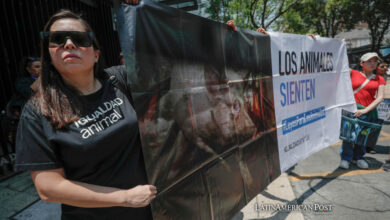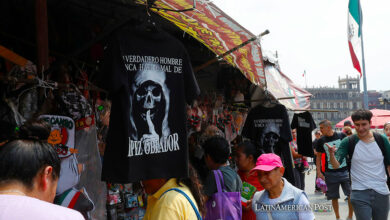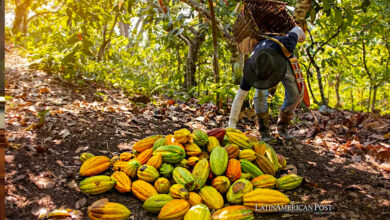Less than 48 hours into his presidency, Ecuador's newly elected leader, Daniel Noboa, fulfilled a campaign promise by repealing controversial guidelines implemented a decade ago. These guidelines decriminalized the possession of specific quantities of illegal drugs, sparking debate and concerns over their impact on drug trafficking and related crimes.

11/23/2023.- The president of Ecuador, Daniel Noboa, speaks during the act of appointment of his Cabinet, today, in Quito (Ecuador). EFE/ José Jácome
The Latin American Post Staff
Escucha este artículo
Leer en español: Nuevo presidente de Ecuador cambia estrategia contra el tráfico de drogas
Addressing Escalating Challenges: Noboa Takes Swift Action
Noboa's swift action came as a response to the rising challenges posed by drug-related issues, particularly the cocaine trade, which had cast a shadow over the lives of Ecuadorians. Incidents of killings, kidnappings, robberies, extortion, and other criminal activities had surged to unprecedented levels, leaving the nation grappling with security concerns.
President Noboa's office released a statement defending the decision, asserting that the previous guidelines had inadvertently "encouraged micro-trafficking" and were deemed a "detrimental element for Ecuadorian society." In addition to repealing these guidelines, President Noboa directed the ministries of interior and public health to collaborate on developing comprehensive programs focused on information, prevention, and control of narcotic and psychotropic substance consumption. These programs will also provide treatment and rehabilitation services to both habitual users and problematic occasional users.
Origins of the Guidelines: Correa's Legacy and Criticisms
The guidelines in question were introduced in 2013 during the presidency of Rafael Correa. They were founded on the premise that illegal drug use should be treated as a public health issue rather than a criminal offense, emphasizing that drug users should not be incarcerated. The guidelines set specific quantities for various drugs in an attempt to distinguish between consumption and trafficking.
According to the parameters outlined in these guidelines, individuals were allowed to carry limited amounts of certain drugs for personal use. These limits included up to 10 grams of marijuana, 2 grams of cocaine paste, 1 gram of cocaine, 0.10 grams of heroin, and 0.04 grams of amphetamine.
From the outset, the guidelines faced significant criticism from Ecuador's political right and conservative sectors of society. Their implementation remained uncertain, even after former President Guillermo Lasso announced his intention to eliminate them in January 2021, citing concerns about their impact on youth and children.
Moreover, Ecuador's Constitutional Court issued a ruling mandating that judges distinguish between drug consumers and traffickers when determining appropriate penalties. With the guidelines, the process of making this distinction becomes more apparent.
Transition of Leadership: Noboa's Short-Term Presidency
President Daniel Noboa assumed office following his victory over Luisa Gonzalez, an apprentice of former President Rafael Correa, in a runoff election held on October 15. Noboa's presidential term will be relatively short, lasting only until May 2025, corresponding to the remainder of Lasso's tenure. President Lasso had curtailed his term when he dissolved the National Assembly in May amidst ongoing impeachment proceedings initiated by lawmakers.
Also read: Ecuador's New President Daniel Noboa's Promises, Challenges, and Reforms
During Lasso's tenure, Ecuador witnessed a troubling surge in violent deaths, with the number reaching a record high of 4,600 in 2022, doubling the figure from the previous year. This spike in violence is intricately linked to the trafficking of cocaine, primarily originating from neighboring Colombia and Peru. Ecuador has become a fertile ground for the operations of Mexican, Colombian, and Balkan cartels, which have forged alliances with local criminal organizations.
New Chapter: Noboa's Leadership and Ongoing Challenges
As Ecuador embarks on this new chapter under President Noboa's leadership, the nation faces complex challenges in addressing drug-related issues while ensuring the safety and well-being of its citizens. The repeal of the controversial drug guidelines marks a significant policy shift, and its impact on the country's drug trade and associated crimes will be closely observed in the coming months and years.





